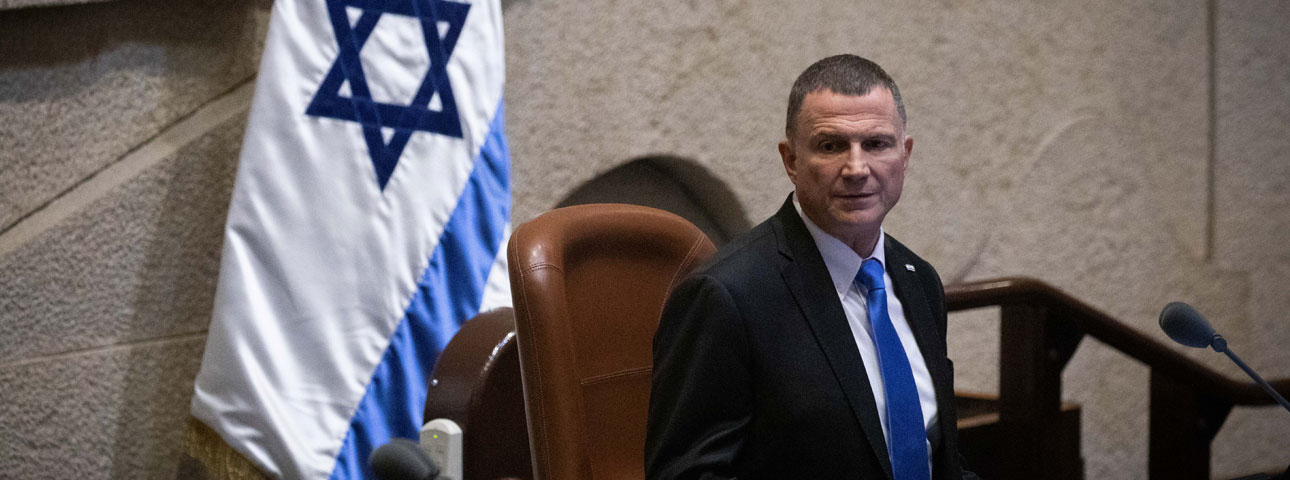Speaker of the Knesset's Resignation – What Happens Next?
Speaker of the Knesset Yuli Edelstein has resigned so as not to comply with the Supreme Court ruling to hold elections for a new speaker - what happens next? IDI’s Dr. Amir Fuchs explains.

Flash 90
When does the Speaker of the Knesset’s resignation take effect?
48 hours from when he submitted his resignation (section 5 2A of the Knesset House Rules).
Does the resignation exempt the Speaker of the Knesset from complying with the Supreme Court’s ruling?
No. The resignation will only take effect in 48 hours. Until that time, he is in violation of the Supreme Court ruling. This is a very serious precedent in which a public official violates an order from the Supreme Court, and even more so—when this refers to the head of the legislative branch. This is a grave violation of the rule of law. There is a possibility that the Court will issue an order on the grounds of contempt of e court, which could include a fine.
What about the balance of power among the different branches of government? Was the Supreme Court’s interference warranted?
The Supreme Court's intervention in the matter of electing the Speaker of the Knesset was required according to the interpretation of the Basic Law; the Knesset, and the Knesset House Rules. In this case, the Supreme Court not only did not 'interfere' with the Knesset's work, on the contrary - it protected it and the right of the majority to act and elect a permanent Speaker of the Knesset, in accordance with the rules and interpretation of the Basic Law. The Supreme Court rarely intervenes in in internal Knesset proceedings, and only when there is serious damage to the fabric of parliamentary life and to the foundations of the constitutional order - and Edelstein’s stubborn clinging to his position---was just that. It is worth remembering the 'Elon Moreh' case in 1979 ‘and Prime Minister Menachem Begin's insistence on upholding the Supreme Court ruling even though he disagreed with it.
What will happen after the resignation?
This is a complicated situation that is not covered in the Knesset's laws or regulations. According to the Basic Law: the Knesset (Section 20A (c)), "When the post of Speaker of the Knesset has fallen vacant - because the Speaker has resigned or has died or because the House Committee has decided that for reasons of health he is permanently unable to carry out his functions - a deputy speaker shall serve as Interim Speaker until the Knesset elects a new Speaker."
However, deputies have not been appointed in the current Knesset that was elected in March. The Arrangements Committee may nominate deputies but is not authorized to elect them (the plenary chooses the deputy speakers, and convening of the plenum for that purpose can only be decided by the Speaker).
So we find ourselves in a situation for which there is no clear solution in either the Basic Law: the Knesset, the Knesset Law, or in the Knesset's House Rules. In this situation, Section 141 of the Knesset by-laws, authorizes the House Committee (and in its absence, the Arrangements Committee) to decide on the matter. A possible solution is that the Arrangements Committee can decide to nominate, based on the logic of section 20 of the Basic Law; the Knesset, when the previous Speaker of the Knesset was not elected, the most senior Knesset member to the position of Interim Speaker of the Knesset (as was the practice before the law was amended in 2016. Until this point, from the moment a new Knesset is sworn in until a permanent Speaker is elected the most senior MK serves as Interim Speaker).
It should be emphasized that this can only happen after Edelstein's resignation goes into effect.
Are there any other options?
If the Speaker of the Knesset was really interested in "'an honorable exit' while also avoiding the violation of a court order, he could (and still can, today) declare that he is unable to fulfill his role. In that case, the Arrangements Committee could exercise its authority under section 141 and declare that the most senior MK will immediately begin serving as the Knesset’s Interim Speaker.
